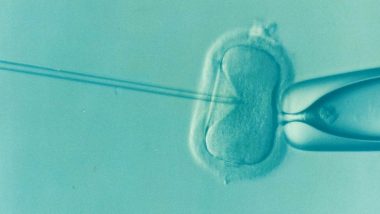Often, in the population of couples unable to conceive, frustration and stress take over and they start looking for alternatives desperately. Amongst various treatments to fertility Assisted Reproductive Techniques (ART), In Vitro Fertilization(IVF) and Embryo Transfer (IVF–ET) are one of the most popular ones. With the help of IVF about a million babies have been born till date. However, while these techniques seem like a boon to many people, they do come with a set of health risks for both the baby and the mother. A study says, 'Management of pregnancies after IVF–ET is difficult as the couples and treating doctors have an undue concern, apprehension, and worry about the outcome of such pregnancies. Patients are elderly, and there may be other co-morbid conditions; hence, pregnancy after IVF–ET is considered as high risk.' Planning to Get Pregnant? Have These 8 Fertility-Boosting Foods to Improve Your Chances of Conceiving
Usually, when the couples are desperate to have a child, they tend to ignore the side-effects of these invasive techniques. Although these Assisted Reproductive Techniques help them get pregnant, the underlying issues are usually dusted under the carpet. The pregnancy loss rates after ART statistics revealed by a study says, 'Biochemical pregnancy loss rates following ART vary from as low as 11% to as high as 35%. The risk of ectopic pregnancy(a complication that causes the embryo to attach outside the uterus) including heterotopic(occurring in an abnormal place) is increased at least 2-fold in patients who conceive after IVF–ET. The incidence of late pregnancy loss (after 12 weeks gestation) after ART is typically between 2 and 4% which is higher than that of spontaneously conceived pregnancies (around 1%).5 There is a higher propensity of multiple pregnancies. The risk of multiple pregnancies is increased substantially in IVF–ET cycles.' Challenges of IVF-This Picture Of Baby Surrounded by Syringes Tells a Touching Story!
Here Are The Dangers of In Vitro Fertilisation both on the mother and baby that you should know of.
- Premature delivery and low birth weight. One of the most common risks of IVF is Premature delivery along with low birth weight. According to research, the chances may differ from person to person depending on their case.
- Multiple births. You are more likely to have twins or triplets because of IVF depending on the number of embryos implanted in your uterus. Multiple fetuses pregnancy is riskier than the single fetus'.
- Miscarriage. Research shows that using fresh embryos for IVF increases the rate of miscarriage than the usage of frozen embryos.
- Ovarian hyperstimulation syndrome. The procedure may require the use of injectable fertility drugs, such as human chorionic gonadotropin (HCG) to induce ovulation. This can increase the risk of developing ovarian hyperstimulation syndrome causing your ovaries to become swollen and painful. A few people may also generate a severe form of ovarian hyperstimulation syndrome that can also cause rapid weight gain.
- Complications during the process of Egg-retrieval: The procedure generally uses aspirating needles to collect eggs, and that could hold some risks of infection, damage to the bowel, bladder or a blood vessel, etc.
- Ectopic pregnancy. Like mentioned above there are chances that 2 to 5 per cent of women may have Ectopic pregnancy due to IVF. It causes the fertilised egg to implant outside the uterus, usually in a fallopian tube. The eggs may survive, but the pregnancy needs to be terminated.
- Ovarian cancer. While this point may be a little controversial, more studies are required to prove this. Some older studies have shown a link between certain medications used to stimulate egg growth and the development of a specific type of an ovarian tumour.
- Congenital disabilities. Depending on the age of the mother there is a risk of the development of birth defects in the child. While some experts believe otherwise, the age of the mother comes into play big time.
- Stress. IFV financial, physically and emotionally draining and may increase your chances of stress.
While there are risks involved in any kind of invasive procedures, one must always keep in mind that in terms of IVF you have to excessively careful about the institution and the experts they are planning to take help of. Have you had an IVF birthing or are planning to? Put down your views in the comments section. How To Get Pregnant: 7 Things That Will Help You Conceive Faster
(Studies: Short and long-term risks to women who conceive through in vitro fertilization. /Complications in pregnancies after in vitro fertilization and embryo transfer)
(The above story first appeared on LatestLY on Sep 20, 2018 01:51 PM IST. For more news and updates on politics, world, sports, entertainment and lifestyle, log on to our website latestly.com).













 Quickly
Quickly


